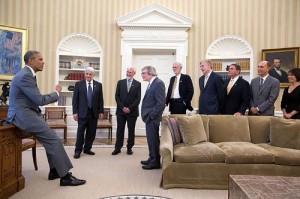
OXNARD, Calif., — At the White House this week, President Barack Obama welcomed the four American laureates of the 2014 Kavli Prizes – prizes awarded to scientists who have made seminal advances in the fields of astrophysics, nanoscience, and neuroscience.
Joined by White House Office of Science and Technology Policy Associate Director Jo Handelsman, the President congratulated Kavli Prize Laureates Alan H. Guth (Massachusetts Institute of Technology), Andrei D. Linde (Stanford University), John O’Keefe (University College London) and Marcus E. Raichle (Washington University in St. Louis School of Medicine).
Accompanying the laureates were Rockell N. Hankin, Chairman of The Kavli Foundation, Robert W. Conn, President and CEO of The Kavli Foundation, Miyoung Chun, Executive Vice President of Science Programs of The Kavli Foundation, and Kåre R. Aas, the Norwegian Ambassador to the United States.
“This year’s Kavli Laureates are working on the frontiers of human knowledge and capability, from the far reaches of deep space to the intricate neural networks of the mind,” said John P. Holdren, President Obama’s Science Advisor. “Achievements like these will no doubt inspire dreamers across the Nation to ask bold questions and take on the challenge of discovering answers.”
“We could not be more grateful to President Obama for honoring these laureates, or for the President’s strong and continuing commitment to science,” said Rockell N. Hankin. “The U.S. laureates exemplify the very best of what science can achieve in this country. Along with being a tremendous honor, this visit provides us a moment to pause and appreciate just how important science is to the nation and all humanity.”
“It’s been The Kavli Foundation’s great honor to join with the President in his efforts to advance science in the United States, particularly by playing a catalytic role in the BRAIN Initiative, which is a national initiative to produce a dynamic picture of the brain in action,” said Robert W. Conn. “We thank the President for so strongly shining a light on the importance of truly basic scientific research.”
The 2014 Kavli Prizes laureates were selected for pioneering the theory of cosmic inflation, for transformative contributions to the field of nano-optics and for the discovery of specialized brain networks for memory and cognition.
The Kavli Prize in Astrophysics is shared by Alan H. Guth, Andrei D. Linde, and Alexei A. Starobinsky (Landau Institute for Theoretical Physics, Russian Academy of Sciences, Russia). They received the prize for pioneering the theory that very soon after our universe came into existence it underwent a short-lived phase of exponential expansion. During this brief period the universe expanded by a huge factor – hence the name inflation. The consequences of this episode were momentous for the evolution of the cosmos. The field of inflation theory now occupies thousands of theorists, and many variations of inflation are being actively debated.
The Kavli Prize in Nanoscience is shared by Thomas W. Ebbesen (Université Louis Pasteur, Université de Strasbourg, France), Stefan W. Hell (Max Planck Institute for Biophysical Chemistry, Germany), and Sir John B. Pendry (Imperial College London, UK). They received the prize for challenging established beliefs about the resolution limits of optical imaging, showing that light can interact with nanostructures smaller than its wavelength. Seeing at the “nanoscale” had long considered to be limited in visible resolution by the finite wavelength of ‘light’, so that only objects larger than ~ 200 nanometers could be imaged. Each of this year’s prize winners, through their different insights and routes, has independently advanced our ability to ‘see’ nanostructures using ‘ordinary’ light. This ability to see and image nanoscale objects is a critical prerequisite to further advances in the broader field of nanoscience.
The Kavli Prize in Neuroscience is shared by Brenda Milner (Montreal Neurological Institute, McGill University, Canada), John O’Keefe and Marcus E. Raichle. The laureates have all played major roles in advancing our understanding of memory and in the development of techniques to measure the brain. They discovered that these functions are produced by specialized systems in the brain, which they analyzed through a variety of research approaches. They have found the specific regions of the brain that are involved in memory, and how specialized nerve cells perform different roles. Knowing how memory function should work in healthy people could open the door to understanding what has changed in patients with dementia and memory loss.
The Kavli Prize is a partnership between The Norwegian Academy of Science and Letters, The Kavli Foundation and The Norwegian Ministry of Education and Research. The Prize was established to recognize outstanding scientific research, honor pioneering scientists, promote public understanding of scientists and their work, and foster international cooperation among scientists.
The Kavli Prize consists of a gold medal, scroll and a cash award of one million dollars in each field, with the prizes awarded biennially. Kavli Prize recipients are chosen by committees comprised of distinguished international scientists recommended by the Chinese Academy of Sciences, the French Academy of Sciences, the Max Planck Society (Germany), the U.S. National Academy of Sciences, The Norwegian Academy of Science and Letters, and The Royal Society. After making their selection for Prize recipients, the recommendations are confirmed by The Norwegian Academy of Science and Letters. The formation of Prize Committees and the selection of prize recipients is independent of The Kavli Foundation – a nonprofit U.S.-based foundation dedicated to advancing science for the benefit of humanity, promoting public understanding of scientific research, and supporting scientists and their work.
The 2014 Kavli Prize Laureates will receive their medals this fall during a ceremony held in Oslo, Norway. For more information, visit http://www.kavliprize.org.





Comments are closed.